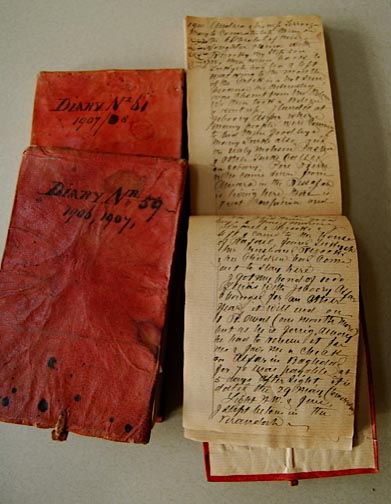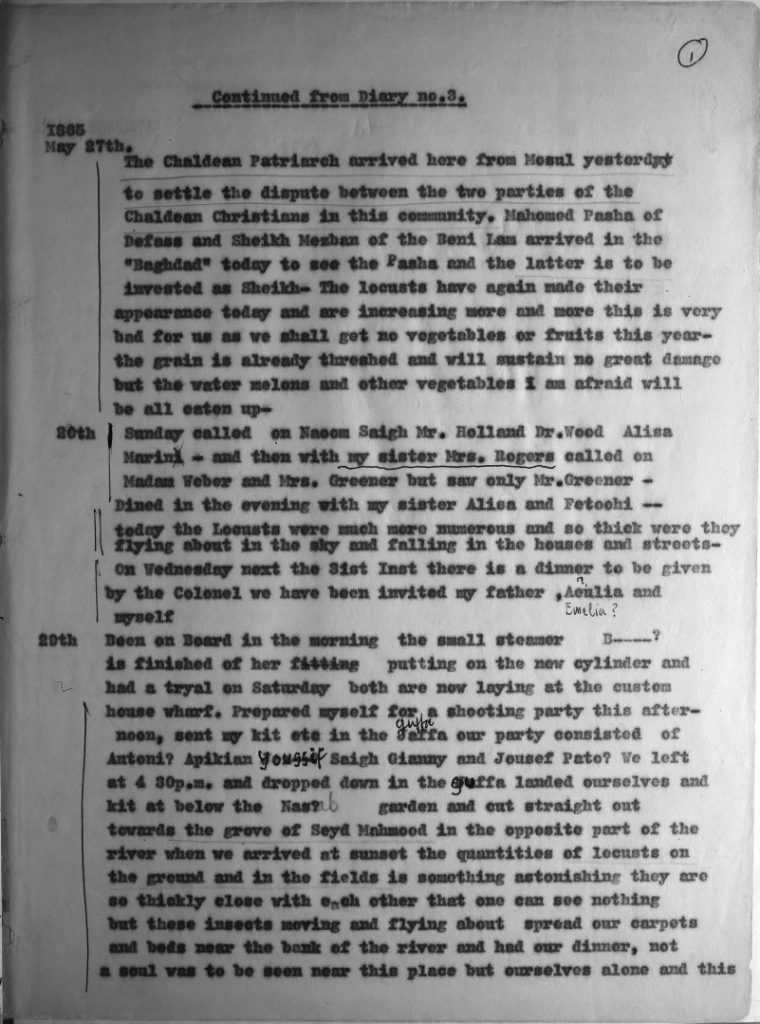
Joseph Mathia Svoboda started writing his diaries on 12 February 1862, the same day he began working with the Lynch Brothers Trading Company. As part of the Lynch Brothers’ Euphrates and Tigris Steam Navigation Company, Svoboda made constant journeys back and forth from Baghdad to Basra and documented details from these trips in his diaries. Most of these entries focused on steamer trips and described the weather and wind, recorded cargo and passengers, and listed different locations along his journeys. Svoboda’s diaries are also a valuable source of information about life in late nineteenth-century Iraq. For example, some entries describe epidemics spread by steamer traffic, and how these illnesses were brought under control by the authorities. In 1897, his son Alexander Richard Svoboda began keeping a travel journal, documenting a trip through the Middle East into Europe over the course of three and a half months.
In 1929, Alexander Svoboda left his father’s diaries with an unnamed Catholic priest, who turned them over to Ya’qub Sarkis (1876-1958), a historian from Baghdad. Sarkis took notes in Arabic on the margins of the diaries as part of his research on Iraq. He kept the diaries in his private library and later transferred them to Baghdad College, later renamed Al-Hikma University. After the university was nationalized during the Saddam Hussein regime, some of the diaries in the Sarkis library were moved to the Iraqi National Museum of Antiquities and the National Manuscript Center.

In the 1970s, Al-Hikma University scholar Margaret Makiya borrowed and began transcribing the Svoboda diaries. In 1985, Svoboda family descendant Professor Henry Svoboda, who was head of the Architectural Consultancies of Iraq, began writing a family history Iraq with architect Nowf Allawi using Makiya’s transcriptions.
After the United States invasion of Iraq, continuing the research in Baghdad became difficult. In 2016, after the death of Professor Henry Svoboda in 2006, Allawi contacted Professor Walter G. Andrews and the Ottoman Texts Archive Project (OTAP) at the University of Washington for assistance in continuing this project. Using copies of the Makiya transcripts as well as digital images of the original Svoboda diaries acquired through Makiya’s son, the Svoboda Diaries Project was born.
Today, the Svoboda Diaries Project continues to flourish, growing from the work of one faculty member, a staff consultant, and a few interns to a large project employing many undergraduate interns from different fields of study. The project already produced a translation of the travel journal of Alexander Richard Svoboda in a bilingual digital edition in 2011, which is also available through the project site. Members of the project have presented at local and national research conferences such as the University of Washington’s Undergraduate Research Symposium, the Middle Eastern Studies Association (MESA), the Visualization for the Digital Humanities (VIS4DH) workshop, and the Canadian Society for Digital Humanities (CSDH). In addition, it has inspired a few master’s and doctoral theses. The Svoboda Diaries Project continues to actively publish diaries and improve the accessibility of these digitized materials so they can be used as tools for research both within the project and outside of it.